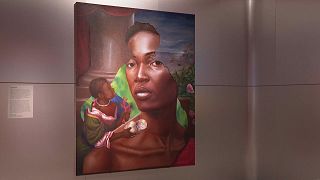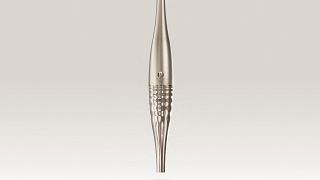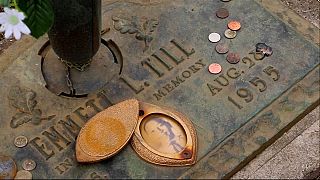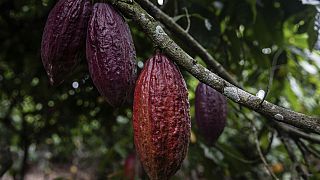United Kingdom
The works of British sculptor Thomas J. Price celebrating 'everyday' Black people have gone on display at London's Victoria and Albert Museum.
The artist's works have been placed throughout the museum's galleries, disrupting traditional displays of mythical figures and privileged elites.
"When I was at art school, the works here are a lot of the work I was referencing in terms of what we are told is powerful or what we're told is prestigious. And not seeing anybody look like myself in amongst these people," explains Price.
"So it's quite incredible experience to see the works put up against in contrast to the sculptures here and the power that they have when they're sitting alongside them."
'Ordinary' people
While the faces and poses of the statues may seem familiar, none of them are based on a specific person.
Instead, Price created the sculptures using composites of different faces and bodies, inspired by Britain's Black community, often drawn up digitally before the artist commits them to clay and bronze.
"So these works are fictional characters, so they're already critiquing the idea of portraiture, this idea that a singular individual's narrative is so important that it elevates them above everybody else. So the idea is that by using elements of many different people, we are sort of creating a value or recognising the value in each other and the common elements of one another," he says.
One of his best-known sculptures is on display in the courtyard space outside the V&A.
The bronze woman of "Moments Contained," standing tall with her hands in her pockets, is being exhibited in the courtyard space outside the museum.
"It's really exciting to see a 12 foot bronze work of a contemporary looking person that's not taking on the same sort of mannerisms of excessive power," says Price.
"'Moments Contained' is about a contained sense of confidence and intrinsic understanding of one's own value. And it's not about trying to domineer and conquer."
The statue in normally located in the Dutch city of Rotterdam.
Diversity in the art world
The art world has been making a greater effort to show greater diversity.
Museums and galleries have been reviewing their collections to include more works of and by women and people of color.
Curator of the V&A's exhibit, Melanie Vandenbrouck says the full impact of Price's work is seen when they are directly compared to the more traditional pieces.
"It was really important to us to show how representation in the 21st century compares to representation in the 17th, 18th and 19th century, how much more democratic sculpture has become."
The faces of people of colour - seen in 'Numan (Shifting Votive One),' 'Untitled (Head 24)' and 'Lay It Down (On the Edge of Beauty)' - sit on plinths next to traditional sculptures.
"(Price's) work is not about aggrandising individuals, it's not about portraiture. It's about the everyday person. It's about all of us. And in this, it's just work that makes you feel valued and respected and heard and seen," adds Vandenbrouck.
Price welcomes the changes in the art world.
"The inclusion that's happening and the rehangs at a lot of institutions now is really important because this acknowledgement of who exists in this country, its acknowledgement of who's given contribution throughout history in the United Kingdom. We think back to the Windrush, for example, the massive contribution that the Windrush generation has given and the descendants, I'm one of them. I'd like to feel that we were valued. And if we're going to have statues, if we're going to have monuments, if we're going to kind of adhere to that way of thinking, then we need to be representative," he says.













00:51
UK is finalising Chagos deal with Mauritius
Go to video
Pics of the day: March 21, 2025
01:01
Heathrow fire disrupts flights
02:47
British national killed in Kenya by President's motorcade vehicle
Go to video
Pics of the day: March 12, 2025
Go to video
Pics of the day: March 03, 2025